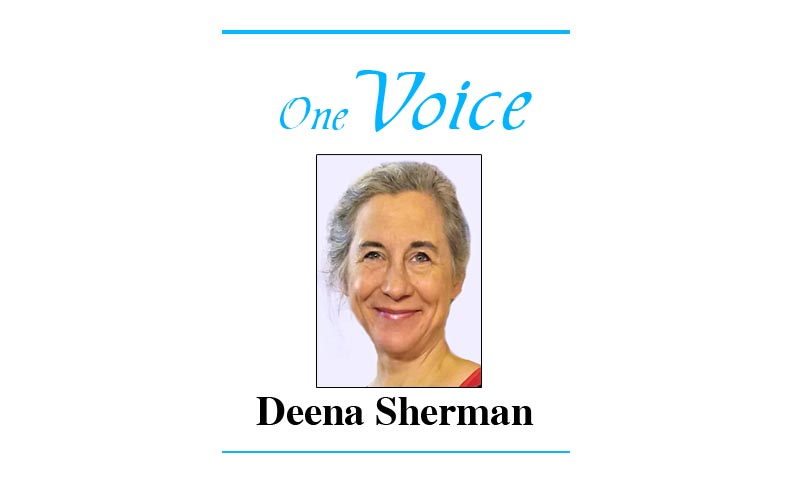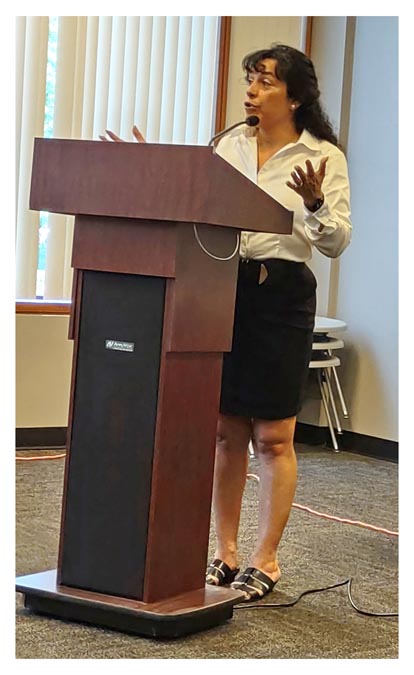
I love it when Aurora is on the cutting edge of something great. A few weeks ago I met Norma Peterson at the Farmers Market in Aurora. She is the sister-in-law of the infamous Drew Peterson and has devoted her life to helping those who are victims of domestic abuse. If you go to her website, DocumentTheAbuse.com, you can learn how victims can collect their information in a safe, secure, place, with an Evidentiary Abuse Affidavit (EAA).

Thursday of last week I attended a presentation by Ms Peterson at the Kane County Judicial Center with community lawyers, police officers, investigators, and other first responders. The room was packed and her message on the importance of the EAA project was well received.
Peterson began with the statistic that 20 persons are abused in the United States every minute of every day. It is apparent when she speaks that her heart is still broken over what her late sisters-in-law endured. It is Peterson’s personal mission to ensure others in abusive relationships have the resources to give them a strong voice with which to prosecute their abusers, whether in life or from beyond the grave if they are murdered.
An EAA allows victims to assemble written accounts of abuse, photos, police and hospital reports, text messages, and sometimes even DNA evidence online. Peterson explained that victims often give bits and pieces of evidence to various friends and family and trauma can make it difficult to keep the past incidents straight when they testify. This resource helps them to put everything in one place, on a secure free web-based app where an abuser can’t find it.
Once an account is created, the abuse victim can choose to print and notarize the information or to share the information with those such as doctors, emergency room personnel, therapists, police, and lawyers. Until they choose to share it however, the information is absolutely secure and cannot be accessed without a subpoena.
One of the most powerful tools in the EAA is the ability to make a video of the client describing the abuse. If an abuser renders a victim unable to testify, this gives the victim a voice in court under “Forfeiture of Wrongdoing,” because the abuser has denied the victim the power to speak.
Peterson said she got a call from a police officer in Georgia, who was investigating a homicide. He had heard about this project and had hoped the deceased might have an EAA. Sadly, she did not. Police and lawyers who learn about this resource are anxious for a day when it is common practice for victims to have this information collected. It saves precious time and investigative resources. There have been inquiries from across the country and even from other countries. Kane County will be the model for it to be launched nationally.
Victims are often blamed for not leaving soon, but in order to do this, they need a safe place to go. It is why Peterson wants to collaborate with Aurora’s Mutual Ground. Aurora is where it starts.
During the question and answer period following Peterson’s presentation, there was a spirit of collaboration. Attendees looked for ways to make this resource even better. They want to help balance privacy concerns with making information available to proper authorities and giving it the best chance of winning convictions in court.
Everyone’s goal is to have better outcomes for abuse victims. Helping these survivors recognize the abuse patterns might help them seek help sooner. Having accurate documentation will help them in court when they do. Peterson’s personal goal, though, is giving a new legacy to her late sisters-in-law, Kathleen and Stacy. She wants them to be remembered not as victims, but as the inspiration for a resource that will help empower others. They are the angels who oversee this tool in the ongoing fight for justice.

